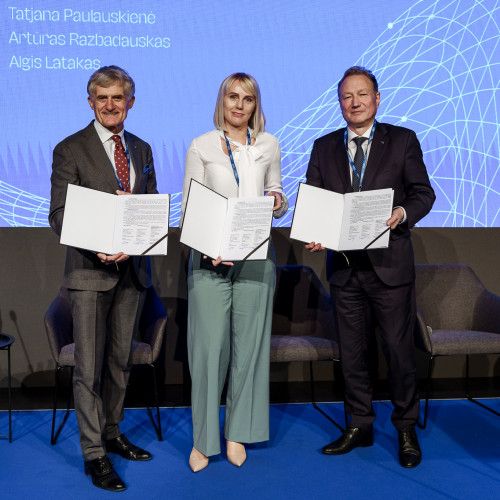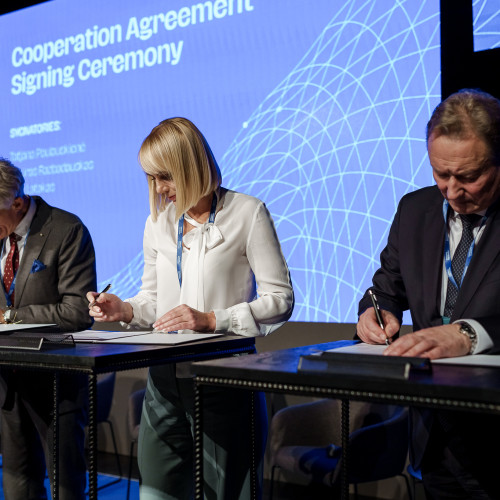The partners in the contract are Inobiostar, a spinoff of Klaipėda University (KU), Klaipėda University, and Klaipėda State Seaport Authority. Their leaders – Tatjana Paulauskienė, Artūras Razbadauskas, and Algis Latakas – confirmed today with their signatures their joining forces to ensure that the process of realising the researchers' idea of an aerogel to neutralise oil spills gains the greatest possible momentum. The partners describe the context of the Klaipėda Manifesto as logical for the signing of such an agreement, as the sea and maritime industries are at the heart of the blue economy.
The new product is being developed by an international team of researchers led by prof. dr. Tatjana Paulauskienė. The researchers have successfully developed, tested, and patented in the EU an environmentally friendly biotechnology to neutralise oil pollutants in the sea based on straw, an inexpensive product of the farming business. The researchers hydrophobised the straw and "enriched" it with micro-organisms isolated from the natural environment of the Baltic Sea, which can degrade and neutralise oil products. The technology that does not create secondary pollution already has an EU patent and is in the commercialisation phase of the innovation; attractive forms of marketing and potential investors are looked for.
In recent years, the research team has been simultaneously working in the laboratory on another material, aerogel that can neutralise oil spills. According to dr Tatjana Paulauskienė, this is a multifunctional material that can be used as a sorbent to remove oil contaminants or paint from the surface of water. Aerogel is made from waste paper and has properties such as environmental and climate friendliness and lightness as well as high porosity and surface area. The material can be produced in different sizes and shapes. However, this is still being done in the researchers' laboratories. Studies combining the developed biotechnology and the aerogel are planned in the near future and, if successful, could lead to a product with exceptional properties on the market.
Dr Paulauskienė says that all the aerogel tests so far have shown a great commercial potential of this idea. Thus, for example, the efficiency of aerogels is twice as high as the existing analogues on the market.
"The product we are developing is aimed at businesses that maintain the sustainability wave and aim to move towards a climate-neutral economy by 2050. We know that the Baltic Sea is one of the most polluted in Europe. Oil spills, big or small, contribute to the decline of the sea's health. We believe that the product we are developing will be useful in reducing risks to marine ecosystems, human health, and the economy. This is why we are seeking to bring together a consortium of strategic partners to pool our knowledge, expertise, and resources in order to develop a unique, environmentally and climate-friendly product, and to work together towards the goal of a cleaner and healthier Baltic Sea," says prof. Paulauskienė.
"Innovative biotechnologies to capture or neutralise petroleum products more efficiently, without the use of chemicals, are part of the Green Deal. About a year ago, we tested a biotechnology developed by Klaipėda University researchers in the port area; it has been patented, and obviously the project is being developed and has further progress. Today, by signing an agreement with Klaipėda University and the company Inobiostar, we have agreed to develop and test this product, which I believe will be significant both in our activities and in other countries. The priority of the Port of Klaipėda is to be environmentally friendly", says Algis Latakas, Director General of Klaipėda State Seaport Authority.
Innovations that promise a qualitative and value change in the field of oil spill containment and neutralisation are being born at Klaipėda University. Rector of KU, prof. dr Artūras Razbadauskas, who signed the tripartite agreement, stressed that investment in scientific thought pays off for society. "Today's world is dealing with major ecological challenges. I am glad that our researchers are also on the path of finding solutions. I believe that our ambition to clean up the Baltic Sea safely, without creating new pollution hotspots and by harnessing the power of nature itself, will be a success," says prof. Razbadauskas.
According to dr Paulauskienė, the average development time for research-based technologies is about seven years. The aerogel team is currently seeking financial support from the European Union's Framework Programme for Research and Innovation Horizon Europe EIC Accelerator, which is usually used to stimulate "breakthrough" innovations. The guaranteed financial resources would allow the necessary experimental studies to be carried out and small-scale production of aerogels with oil-degrading micro-organisms to start in Klaipėda. It is estimated that this product could be commercially available in about five years.








